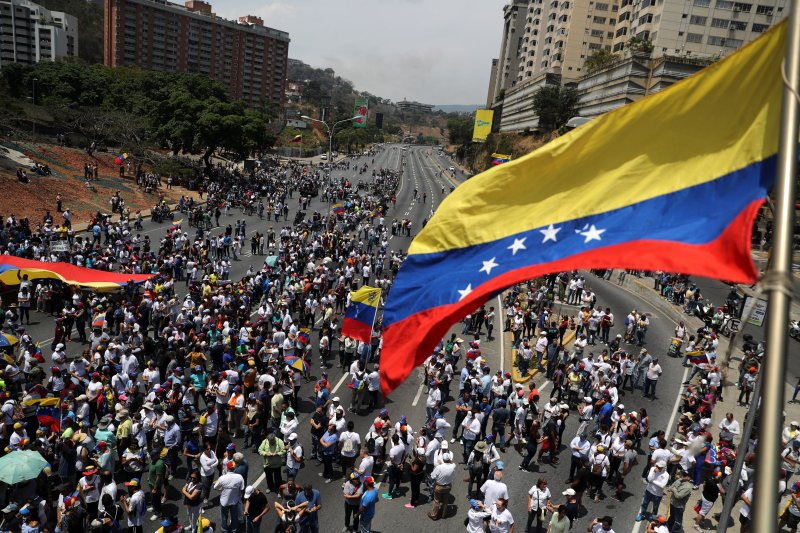The United States is now applying pressure on the European Union to apply sanctions on Venezuela. File Photo by Miguel Gutiérrez/EPA-EFE
Sept. 23 (UPI) -- With the backing of the United States, more than 15 Latin American countries voted to increase pressure on the Venezuelan government, in a renewed push to force President Nicolas Maduro from the country's helm.
In New York, foreign affairs ministers voted to invoke a rarely used treaty, called the Inter-American Treaty of Reciprocal Assistance, to apply sanctions against individuals and entities connected to the Maduro regime, which they charge with facilitating money laundering, illegal drug trafficking, terrorism and committing human rights violations.
Generally called the Rio Treaty, the 1947 pact signed by 19 nations coalesces a regional response when a state is attacked or suffers a situation that may jeopardize regional peace.
During the meeting organized by the Organization of American States, 16 of the nations voted to invoke the treaty that was last used following the Sept. 11, 2001, terrorist attack in New York. Uruguay voted against imposing the treaty while Trinidad and Tobago abstained and Cuba was absent.
The resolution says all signatory nations will identify former and current senior government officials and those associated with the crimes leveled at Maduro's regime and add them to a consolidated list for the purposes of applying sweeping sanctions and to pursue prosecution.
Prior to the vote, Deputy Secretary of State John Sullivan said the ministers' decision will redirect the future of Venezuela while reaffirming their commitment to the Americas' right to democracy.
"Words on paper are only as good as the actions that flow from them," he said in his remarks urging the nations to vote in favor of the regional action. "The Rio Treaty affords an opportunity to the region to finally take corrective action."
The resolution also places heavy emphasis on the human rights abuses committed by Maduro and his government, blaming it for the 4.4 million who have fled the country in recent years due to economic hardship.
The United States, along with some 50 other democratic nations, has put its backing behind Venezuelan opposition leader Juan Guaido, who became the self-appointed interim president of the nation after Maduro's re-election was deemed illegitimate last year.
The United States sees the Rio Treaty as the start of a larger campaign to isolate Venezuela, hoping that other countries, such as Canada, Brazil and the European Union, will impose similar pressure.
"Our goal is to move more countries -- in this hemisphere and in Europe -- to the imposition of sanctions, which we think has a really significant political and psychological effect on the regime," a senior State Department official told reporters Monday along the sidelines of the United Nations General Assembly in New York.
The United States has already sanctioned more than 200 people connected to Venezuela, but as more nations apply sanctions, the "more isolated the regime becomes," he said.
The United States has been particularly pressing European Nations to take greater action as State Officials fear Venezuelans are using it as a place to hide money and stash their families.
"We think there's something very unseemly about allowing Europe to turn into a kind of resort area for regime bigwigs and their families who have children, wives, mistresses in Europe; bank accounts, houses -- the Europeans should not be permitting this," the official said.















